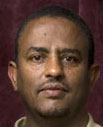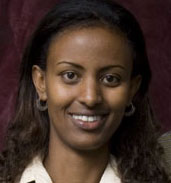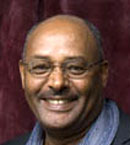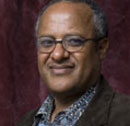2005 Summer Institute in Reproductive Health and Development
In Ethiopia, one of the poorest countries in the world, men can expect to live to the age of 49 and women can expect live just two years longer, according to the WHO. For every 100,000 births, 871 mothers die as a result of pregnancy or childbearing. For every 1,000 children born, 177 boys and 160 girls will not live to celebrate their fifth birthday. On top of that, the HIV/AIDS rate for Ethiopian adults is 6.6 percent.
These are devastating problems, but they are being confronted in a number of ways, according to four Ethiopian public health professionals who attended the Summer Institute in Reproductive Health and Development, sponsored by the Bill and Melinda Gates Institute for Population and Reproductive Health.

Abdulhamid Ahmed
Abdulhamid Ahmed , an OB/GYN professor at Addis Ababa University and an Internet-based master of public health student at the Bloomberg School, is a co-investigator in a clinical trial aimed at reducing mother-to-child transmission of AIDS, a cooperative study between Addis Ababa University and Johns Hopkins. He is also the coordinator of the “Safe Motherhood and RH Project,” which was initiated in three rural areas of the country in order to improve access to life-saving procedures and ensure skilled care during childbirth.
Many people still underestimate the population problems in Ethiopia, he says: “For example,” he says, “Americans ask, why do so many mothers die?” The reasons are many, and most of them come down to obstacles of access to health care providers and facilities.

Trhas Hailu Tesfaye
That’s the concern of Trhas Hailu Tesfaye, an economist who conducts research in family planning, reproductive health and AIDS. Only 50 percent of the population has access to care because of obstacles such as poor roads in rural areas (where 80 percent of Ethiopians live), facilities not being near where people live, and an overall lack of providers. Tesfaye is planning to use what she learned in the Institute’s seminar on Research Methods in Reproductive Health in her work at the Miz-Hasab Research Center to help improve the lives of women and children by increasing their access to health services.

Sahlu Haile
Sahlu Haile, a senior program advisor for the Packard Foundation since 1998, brought to the Institute his 25 years of experiencing working in reproductive health in many countries in sub-Saharan Africa. At the Institute, he was able to share his extensive experience developing and managing health programs as well as his vast knowledge of the cultural and social issues that affect reproductive health.

Negatu Mereke
Negatu Mereke, head of the National HIV/AIDS Prevention and Control Office, which coordinates HIV/AIDS prevention programs in Ethiopia, says that the Institute is teaching him effective ways to implement a project his organization is setting up whereby health workers will help fight AIDS by educating people in individual communities—one post for every 5,000 people—about safe sex practices and the disease in general.
“The Institute teaches us how to lead, how not to have a system that works from the top down. This really helps us work with people with a common vision,” he says. —Kristi Birch
